
Stewart Copeland
The Other Way of Not Stopping
Ian Koss
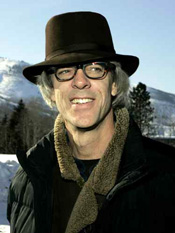
After The Police imploded in 1984, fans were left picking through the shards like kids going through the parts of a broken toy, hoping to find some interesting bit of clockwork or formed plastic that will provide some added enjoyment past the plaything’s brutally terminated lifetime. Bassist/vocalist Sting rebounded with some acting gigs, and Dream of the Blue Turtles, a jazzy album which was good enough to launch a fairly successful career in adult radio, but in perspective only added incrementally to the genre. Guitarist Andy Summers returned to his roots, releasing a string of guitar albums which showcased his distinctive style. These were neat, somewhat satisfying, but in the end, not fun.
Drummer Stewart Copeland, on the other hand, turned to work with film, something he’d started with the surprising and unconventional Rumblefish. Traveling to Africa to explore the roots of American music, Copeland instead delved into the source of rhythm and its relation to humanity, packaging the whole experience as The Rhythmatist, a film whose soundtrack is generally available (and also highly recommended) but which has unfortunately been left behind the analog curtain, as it’s not available on DVD.
This was only the beginning, as Copeland’s successes in this and other film/television ventures (including Wall Street and the TV series The Equalizer) threw the door wide open for a steady stream of soundtrack work. In addition, the last twenty years have seen him branching out into opera and playing drums with other highly-talented musicians, like Stanley Clarke and Deborah Holland in Animal Logic, and Les Claypool (Primus) and Trey Anastasio (Phish) in Oysterhead. Copeland also has a recurring gig as a concert drummer in Italy, and more.
Recently, Copeland transferred 50 hours of Super 8 film footage gathered during his stint with The Police and assembled Everyone Stares, which is the closest, grittiest, most joyful documentary you will ever see about a band. With the DVD roaring up the charts (no doubt propelled by it’s reasonable, less-than-a-Police-CD pricing, Copeland is once again coming to the forefront in America. Speaking from his Los Angeles recording studio, Copeland discussed this project and some more – ahem, unusual – gigs.
• •
You’re at your studio…
Yes I am, in my Ivory Tower here, in the leafy secluded valleys of the canyon.
What are you working on right now?
Selling my DVD, as a matter of fact. I haven’t written a note in living memory. Since this movie got real, it has eaten my life, it has destroyed my life.
It’s been about a year now, since it started making the rounds?
It all began the evening before Thanksgiving, when I got a call from the Sundance people. Just on an off-chance, on a whim, I’d sent them the movie, and was extremely surprised. I had forgotten all about it when they called back and said that they wanted to present it at the festival. Since then, it’s been a whirlwind, I’ve had to hire a crew, I had to professionalize the thing, I had to go license everybody, I had to make it legal… and I’ve been through all these different stages. Now, we’re finally [takes a breath]… it’s just promotion now, I don’t have to make the movie anymore, now I just gotta sell it.
The DVD’s been available for a couple of weeks.
Yeah, since last Tuesday. #3 in the DVD charts! How do you like that?
That’s awesome.
[DJ Voice] “Hit the charts at #3”
I like how it’s aggressively priced.
It does seem to be, that’s good. As a filmmaker, I just want a lot of people to see it.
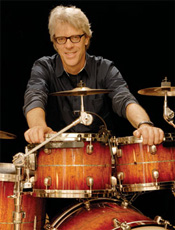
Why did it take almost 25 years for this footage to be assembled?
Because somebody had to invent personal computers.
So you did it all yourself digitally?
Yeah. The original footage is Super 8 film, which is, er, um, film. It’s not video tape even – it’s not digital in any way. It’s a plastic strip with images on it that runs past a light bulb, and to work with it, you have to actually cut it, ‘cause there’s no negative. I couldn’t cut it back in the day, because I was highly destructive. Your readers might have a tough time grasping this, but in those days, when I was young [dramatic pause]… there was no Undo.
I’ll let you think about that for a minute.
That is a frightening concept.
So I wasn’t able to learn it on the job, and it wasn’t until they invented computers, and the application Final Cut Pro, which is a video editing application. Most importantly of all, they invented cheap memory, which sounds very poetic, but what I mean by that is a hard drive smaller than a house onto which I can fit 50 hours of footage.
So you transferred all 50 hours and then went from there?
I had a bit of it transferred, and I was playing with that, and then the obsession took hold. A hobby, at that point, which is much more obsessive than a job. So I got deep into it, and ended up digitizing all of it.
With this project under your belt, are there any hopes for The Rhythmatist to make it out on DVD?
I’ve had a lot of folks at my site hassling me about that, because I have the Super 8 footage that I shot. While I was making that movie, I had my own camera going. So I’d like to do a remake of The Rhythmatist, but that’s on down the road.
Another film I kinda got in the can is the footage that I shot of all the other groups. It’s an interesting period to have a camera rolling, it’s like the cusp. The cusp between long hair and short hair, between flower power and urban anger. I’ve got AC/DC, Robert Palmer and all these old-wave groups, but I also have the beginning of the new wave, starting with Adam Ant, the Clash, B-52s, Talking Heads, UB40, Specials, Madness, Squeeze, Go-Gos, and all these other groups that are cool that you’ve forgotten about. Skafish, the Cramps, Gang of Fours, Pretenders. I’ve got a real cool collection of stuff, and that might be my next movie.
Sounds like an early IRS Records compilation.
It’s a licensing nightmare. My footage is different from anyone else’s, because I had access that no-one else had. I would walk into the bands’ dressing room, turn it over, and they’d all goof off for my camera. And I could go anywhere on the stage, anywhere in the gig.
That was something I found interesting about Everyone Stares – how deep inside the access was.
Well, yeah, I was a member of the band.
Even when you have someone making a documentary that’s embedded in the band, there’s still that awareness of the band being filmed.
The band is there and the camera is here, but in this case, the camera is the band. The viewer walks on stage as a member of the band. The viewer walks right up to my drums and sits down on my drums and looks over and there’s Sting, and the viewer is addressed personally by Andy Summers, shouting “Too fast!” When you watch the movie, you’re the drummer in the band and your name is Stewart.
Do you still have that camera?
Yes I do! Actually, that same model, I went through two of them. One of them just got so banged up that I just bought a brand-new exactly-the-same model.
Can you still get Super 8 film for it?
You can… it’s a real cult at the moment. A lot of directors just love the look of it, and love working with it. So fortunately, there is still film made for it and places you can develop it. Here’s another thing for your readers to grasp: you didn’t just shoot an hour of videotape into your camera, you had three-and-a-half minute canisters of film which you’d have to send off to the photographer shop to have them developed, and wait three days before you could see it. You couldn’t just shoot anything that moved, you had to plan your shots.
How many of those little canisters did you go through?
I never counted the exact number, but they added up to 50 hours of footage. 50 hours divided by 3.5 minutes…
Close to a thousand.
In shoeboxes. Good thing my wife likes shoes.
It sounds like you have growing interest in film editing.
Oh, I love it. Editing of any kind, whether it’s music on ProTools, or film on Final Cut, I love editing. Or pictures in Photoshop. I’m an application junkie. Gets confusing, working on a film, because I compose on Digital Performer, I have images in Photoshop which I’m animating in AfterEffects, I’ve got Final Cut running and ProTools running, because I’m mixing down. So as I’m going back and forth, “take this selection and nudge it one frame to the left” is a different nomenclature in each of these different applications. After I’ve spent the morning on Final Cut, I’ll go to ProTools and I can’t remember how to do the simplest thing. You know, “nudge to the left.” Aaah, is that “arrow up”, is it “shift this”, and when I’ve got several of them going at once, working in After Effects and Final Cut and Digital Performer and ProTools, and then in After Effects I’m accessing Photoshop files… it got a little confusing at times. Exhilaratingly so, though, because as I said, I’m an application junkie.
Do you do your own tech support, maintain a large network? Is that something you enjoy doing?
No. Plugging it all in, I hate all that. Using the applications, I’m great at all that.
I’d like to go back a little bit and ask you about how you think growing up in Beirut affected where you are today… musically, personally, professionally.
Certainly musically, it affected my musical identity. Growing up surrounded by Arabic music just makes you a different musician from somebody who grows up surrounded by American music. I just grew up in a different-sounding environment, and things that would sound strange or exotic or alien to most people sound really homey and comfortable and easy for me. Ideas that well up out of me are fueled by some of this strange stuff, fueled by different senses, different audio memories from your average American or English musician. I guess. That’s my theory, anyway.
How old were you when you left Beirut?
About 15.
Were you in any bands before then?
Yeah, I was in the Black Knights! Haven’t you heard of them?
The Black Knights?
Yeah.
I have all their records.
Heh. The American School that I went to, the American Community School – Bin Laden was a student there, a few years after me – it was basically American kids, and we played the British Beach Club, the American Beach Club and various parties.
I find it interesting that there’s three Copeland brothers, and they’ve all had a great influence in music, spanning the Police and beyond. And all three were working in very different facets of the music industry – Ian Copeland with booking and touring, and Mile Copeland with IRS Records [original home of the Go-Gos, Squeeze, R.E.M. and many more]. Do you have any theory or explanation for that success?
My brothers always had better ears than me. As a musician myself, I’m somewhat of a musical snob, therefore not the best guy for picking the hit. But both my brothers were very good at picking the hits.
I assume they had the same out-of-America upbringing you did.
Yeah, very much so. I was born in Virginia, in a suburb of the CIA, and when I was two months old the family moved to Cairo, but before I was born, my father was stationed in Cairo, and Syria, and so my siblings, before I was even born, were deeply Middle-Easternized.
Did that give them a different sense for what needed to happen?
I don’t know.
Growing up in a different culture, you have different ideas of what’s important.
Well, you have certain very different ideas of your ethnic identity. I’m much more aware of being American than 360 million other Americans, who are just American, are surrounded by other Americans, and don’t even realize they’re American because everyone else is too. But when you’re “the American kid”… you know, when I left Lebanon and went to boarding school in England, I was “the American kid,” at least in Beirut we were “the American kids.” We were in a country that we were not members of. I guess it’s made me much more patriotic than your average American. Current administration notwithstanding.
Would you ever go back overseas, somewhere, live and work there?
No, once I discovered California, I realized that I’m from here now. But I travel a lot, still.
How often are you touring these days?
Every summer I go to Italy. I get my chops up, I get all hot on the drums, then I go play shows over there for a month and come back to my day job here. Came back last week, actually.
Why Italy in particular?
I just love Italy, and I love Italians. I love the food, I love the ancient monuments, but primarily I like the Italians. They understand and appreciate what life is all about.
Any plans to tour in the United States or elsewhere?
No plans. I played just last week on my way back from Italy, I was persuaded to play the Modern Drummer Magazine festival in New Jersey.
Who else was there?
[Pause] Lots of other drummers I’ve never heard of.
Did you find yourself sticking out?
Mmmm… well, I always stick out, particularly in a roomful of drummers. I guess that’s sort of a warm crowd for me.
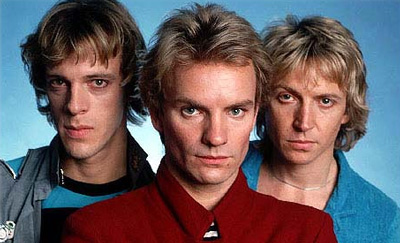
Are there any current artists that you’d like to work with that you haven’t already?
The artists that I’m most interested to work with right now would be Andy Summers and Sting. I’m all fired up with this Police movie, but that aside, there’s my two buddies Trey Anastasio and Les Claypool, otherwise known as Oysterhead, which I’m wild about. I love those guys. We played Bonnaroo also last month, in a deviation from my normal thing. Those guys are a blast – rehearse for a couple of days, walk out in front of 80,000 people and blow them all away. That’s a fun band.
Do you think there’s a lot of intersection between Oysterhead fans and Police fans?
Not at all. I doubt if there’s any intersection at all, as a matter of fact. I’d stopped playing drums for about a decade, and those two guys persuaded me to get back into it, so I practiced up and got back into it, then we figured out a set. We played this show in New Orleans, and when the tickets went on sale, about a month or so before the show, they sold out in twelve minutes. My first though was, “my gosh, ah, warm glow, remembering my fans, the love of my fans,” then I thought, “Wait a minute. My fans have children, they have jobs, they have lives. These tickets were sold to people who are hovering over their computer waiting for them to go on sale, and the minute they did they’re all over it and they’ve sucked up all the tickets. These are not my fans. These are Trey Anastasio’s fans – not even the Primus-heads got a shot at these tickets. The Phish-heads sucked them all up.”
Similarly, for the Oysterhead tour that we did… we made an album and then did a tour. And the Phish-heads just sucked up all those tickets from the Police fans, the Primus fans didn’t even get a look in. But later on, closer to the show, somebody pointed out to me that the Oysterhead tickets for that first show were being sold on eBay for two thousand dollars. Now. Those are my fans.
Do you still encounter Police fans on a random basis?
There are four or five sites dedicated to my humble contribution to the world [clears throat]. And those are all fans of mine, into The Rhythmatist and other work I’ve done, but they’re primarily Police fans.
Also, as I’ve been touring around with [Everyone Stares], interestingly all the people who were 16 back then are now in their late 30s, and they’re now Masters of the Universe. So when I hit KLOS, all of the top brass of the station come on down and they want to meet and shake hands and have their picture taken – they’re running the station now, but when they were 16, they were fans of the Police. It’s funny, I’m meeting with the director about whether he’s going to hire me for his movie, and we get a call that the president of the studio wants to meet Mr. Copeland – some Master of the Universe, age 39 or something, he was big Police fan back in the day. So he comes down, gets his picture taken, goes back to his office. The director looks at me and says, “well I guess that means you’re hired.”
Have you heard any reaction from Sting and Andy Summers about your film?
Oh, yeah, Andy loves it, he’s the star of the movie. He’s all over it. Sting has been very supportive. He claims not to have seen it, because he says he has a phobia now about watching himself on the screen, but… [adopts conspiratorial whisper] I’m not sure if I believe him entirely. He tells me that his kids say he looks great and that’s all I need. He’s been very supportive, makes things fun.
Do you have any hope that this will rekindle…
No, I don’t think so. For me personally, it kind of punctuates the whole adventure. It felt like there was unfinished business before, the film closes the book on it. It sort of puts it all back on the shelf.
There’s always been a lot of speculation and different versions, but Everyone Stares is a document of how it happened.
Really, it is, and it’s unlike any other document. There’s “Behind The Music,” but any documentary about any group or artist, is going to try and make it as objective as possible, and informative as possible, with the cameras over here and the subject is over there, and this film is entirely subjective, it just happens to be the footage that I have. The only material that I have, the only film it is possible to make is entirely subjective.
What do you see yourself doing a year from now?
Gawd… a month from now is a little vague. Hmmm, well actually no, Andy and I are talking about going to Brazil and playing some shows with Milton Nascimento, which sounds like a lot of fun. I could get a Brazilian scene happening sort of like my Italian scene. Looking forward to that, I always enjoy playing with Andy. Bringing along my favorite bass player, Armand Sabal-Lecco, from Cameroon.
In Italy, I’m known as a concert performer, in America I’m known as a film composer, and in England, I’ve blown away all my cred to the wind, and I’m known as a schlock reality TV judge. I’ve been on this show, called Just The Two Of Us, where they have a professional singer/pop star teamed up with a celebrity of some kind, you know, a news reader or a politician, or sports person, and they do these duets and I’m a judge on this show. I’m known as Judge Hard Place – even though my heart is full of love for these performers.
But it is so much fun, when you have these enormous live audiences watching, tuned in to the show, it’s really exciting. The music is horrible schlock, and I’m sorry I have to express myself in slash and burn criticism. Because it is all crap. Horrible songs, horribly performed – but the show itself is brilliant. The human drama of watching the Radio One disc jockey, he’s like super-triple alpha guy, sweating bullets as he sings “Edelweiss,” horrible song but terrific experience watching this guy sweat through it.
It sounds like a non-sequitur. How did the gig come about?
It was just an incoming call. They said “do you want to do it,” I said “well, that sounds like kind of fun.” So I went and did it. Now, I have a fame in England far beyond people’s memory of me as a member of the Police, or people’s knowledge of me as a film composer. In England, I’m that crazy American with glasses who waves his arms and shouts a lot.
That’s not something I expected. Well, the behavior is expected, but not the context.
All the people ask, “Stew, what are you doing?” and I tell them look, watch the show and tell me that isn’t a lot of fun.
Are you still doing it?
Yeah, it goes up again in January. The band is the most whip-cracking band. Full brass section, singers, two keyboard players, three guitarist, the whole deal. Whole schmeer. All triple-scale musicians. And so as they’re sitting in the room… it’s not like American Idol where they just sing. Here they’ve got pyrotechnics, confetti, smoke, it’s really a huge production value. And to sit in the room, ten feet away from this human drama going on, is really kind of amusing. We’ve got 7 million viewers, which is deep penetration for a country that size. I can’t get across a hotel lobby without people saying “How come that’s the one…” – you know the nation is watching this show.
Have you made anyone cry?
Yes, as a matter of fact, though that was not my intention.
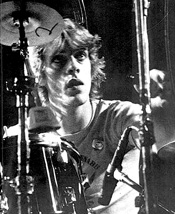
You were just being brutally honest?
No! No, I was just about to hammer into this girl, and she burst into tears. Just knowing what was coming. She knew she screwed up, I was completely dumbfounded. She got me on that, she outplayed me on that one. Good for her.
You have a reputation as the mean judge?
No, actually. I’m not that mean, but I understand the medium better than most of the other judges, who think that they’re judging and giving learned opinions about the performance. No, no, no, no. We’re entertaining the people at home. And eventually, they all got on the program. As far as I’m concerned, anything outrageous and unexpected, that is dramatic, is what it’s all about. I’ve been appointed by Her Majesty, the BBC, to cast aspersions on all these artists, and while we’re sitting there, live, in front of all the cameras, I’m getting a poke in the back, and handed a note from the BBC, upstairs, saying “Draw blood.”
They’re even goading me, in these meetings during the day. Each cast member, each judge, each presenter, everybody, we have these meetings with the producers, the clipboard ladies, who come down and they’ve got notes from upstairs. “OK, Stewart, we really like it when you disagree with the other judges, so go ahead and needle the other judges and disagree with them. Is that OK?” Well, let me talk to Lulu, you know, so she doesn’t hate me… “No no no! Blindside her! Blindside her!”
And then to watch how they create these Franken-bites, where they create dramas, there’s one couple where the pro singer was this opera guy, fake opera singer, sold a gazillion records singing arias. His duet partner was this actress. I went after them one time, in the beginning and they use that, and any time he comes on the show there’s a video clip in the little montage to set you up to the jeopardy of this song that they’re about to sing. It’s always me blasting away at them, so they create that stuff.
There’s another couple where they’re both quite young and quite pretty, and they created sexual tension as if they’re flirting with each other and as if they’ve got a little thing going on, which they didn’t – one of them had a husband, the other had a girlfriend. They juice these little dramas, just a cut of a sideways look combined with a shot of… you know, they can create any drama they want. And you’d never think the BBC would stoop so low.
You just mentioned Lulu – is that Lulu who sang “To Sir With Love”?
Yeah, she was another judge. There were four judges, one was a singing coach. This beautiful woman, African-English. I guess Caribbean. A vocal coach, you look at her and wonder how come she hasn’t got her own deal, she totally looks the part. And then there’s the big radio jock, who’s one of the main guys at Radio One. And Lulu, and I.
An explosive lineup.
It’s a good mix, actually, because Lulu is very mumsy, and she loves everybody. Particularly if it has anything to do with Elton John, her breastmate. The radio jock has the encyclopedic knowledge of everyone who’s ever performed the song, and how this version varies from the way Elvis did it, Frank Sinatra did it, and Bono did it. And the vocal coach just looks beautiful and talks about “you need to get the note from your chest, you need to elongate your vowels, and think about your…” you know, all this bullshit. Nobody knows what the hell she’s talking about, but it makes everybody feel as if there’s some actual analysis going on. I know what it’s all about, it’s TV, it’s entertainment, it’s blood on the tracks.
It sounds like you enjoy this.
It’s so much fun! I will gladly relinquish my credibility for the fun of such a show. It’s only England, for god’s sake.
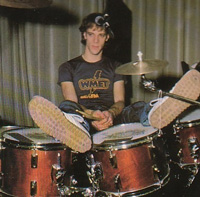
Would you do it in America?
I’d maybe think twice about it, because this is more of an important world for me. But I don’t know, I enjoy it so much, and it doesn’t affect my music one way or the other, it just affects perceptions. And the amazing thing is, when I go online afterwards and check the response – there’s all these different sites dedicated to this kind of show. The show goes up, and there’s immediately hundreds of people, pages and pages of postings on it, and they’re all asking “who’s that American guy with the glasses?” And you realize that it goes way beyond those people with a memory of who the hell I am, out into the broad world out there, you know, Stan in Yorkshire, watching TV with his meat pie in his lap, going “Oo’s that American?” I seem to be going pretty darn well, but it’s like starting from scratch.
Is it your Americanism?
The fact that I’m American makes me stand out from all the other Brits, and the fact that I lived in England for 20 years means that I totally understand the British mentality. And so even though I look to them like an American, I’m much more English than they know.
So there’s a little bit of method acting going on.
I’m a cartoon American, with a deep understanding of the English psyche. I went to British boarding school, as an adult I was in England, my band, The Police, was an English band, I broke out of England. I’m more English than I care to admit. Although – like I said, I’m American, goddamnit.
Stewart Copeland: http://www.stewartcopeland.net/ ◼












